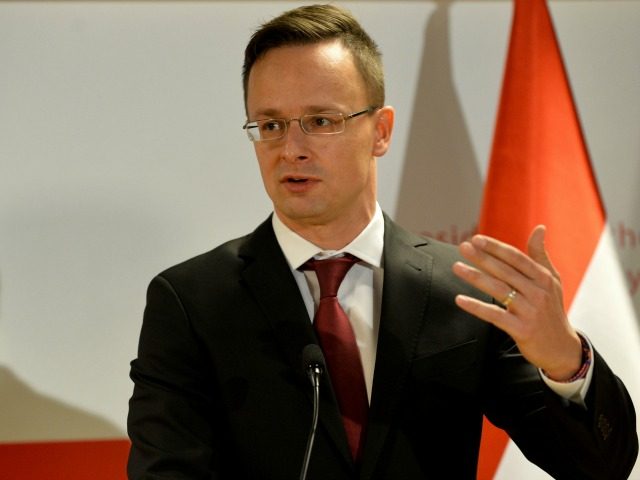Hungary’s foreign minister Péter Szijjártó has praised the American leadership in NATO and said that he did not agree with French President Emmanuel Macron’s assessment that NATO was brain dead.
President Macron had claimed last month that the North Atlantic Treaty Organization was suffering a “brain death”. NATO members are in the UK to mark the 70th anniversary of the defence union, and when asked about the French premier’s remarks on Tuesday U.S. President Donald Trump condemned them as “nasty”.
Speaking to Sky News on Wednesday, Mr Szijjártó said: “I definitely don’t agree with the position that NATO is brain dead. I, of course, agree that there are new types of challenges around us, including security and challenges on the field of defence.
“We have to make NATO able to address these challenges properly, but saying that the alliance is brain dead is too much.”
Acknowledging that the alliance is facing “challenges from the south”, the defence minister raised “the importance of fighting against terror”.
“I think NATO has improved a lot thanks to American leadership,” Mr Szijjártó said.
In January 2017, President Trump had warned that NATO was “obsolete” because it had failed to evolve to deal with current threats and because other members neglected to live up to their two per cent commitment of GDP to spend on defence. Since his criticisms, several European nations have recommitted to paying their fair share of the defence union’s budget, with President Trump saying in April that NATO was “no longer obsolete”.
The U.S. president had said: “The secretary-general and I had a productive discussion about what more NATO can do in the fight against terrorism. I complained about that a long time ago, and they made a change. Now they do fight terrorism. I said it was obsolete. It’s no longer obsolete.”
President Trump Hits Out at ‘Nasty’ Emmanuel Macron’s ‘Brain Death’ Comments at NATO Conference https://t.co/uh7lPNv3pe
— Breitbart London (@BreitbartLondon) December 3, 2019
The Hungarian minister added that NATO does need to devise a “common strategy” to deal with emerging and future threats, such as in terms of cybersecurity, space, and threats coming from China and Russia.
The Hungarian minister said that he is one of four foreign ministers who has established a working group to address new security challenges. He continued: “I think that it is the right time to put our heads together and go forward with a common strategy. I agree with those who say we need to make reforms and adjustments to address the new challenges in a proper way, but I don’t like NATO being criticised in a harsh way.
“We have been members for 20 years. We used to be under Communist oppression. So NATO, for us, is a symbol to regain making our own decisions and choices about our own future. When NATO is being criticised harshly, it is a little bit painful for us.”
In June 2018, Hungary heeded President Trump’s calls to recommit to NATO, with Mr Szijjártó saying at the time that his country had embarked on a comprehensive military development scheme which would enable the central European country to honour its defence pledge.
Member of European Parliament Balázs Hidvéghi told Breitbart London in June 2019 that Hungary remains “devoted to NATO” but that Europe “should do more to strengthen its defence capabilities. Militarily, Europe needs to grow up, and defence-wise, and we need to spend more and do more.”
Trump Trolls Macron by Offering Him ‘Some Nice ISIS Fighters’ https://t.co/M7hVznIc16
— Breitbart London (@BreitbartLondon) December 3, 2019

COMMENTS
Please let us know if you're having issues with commenting.